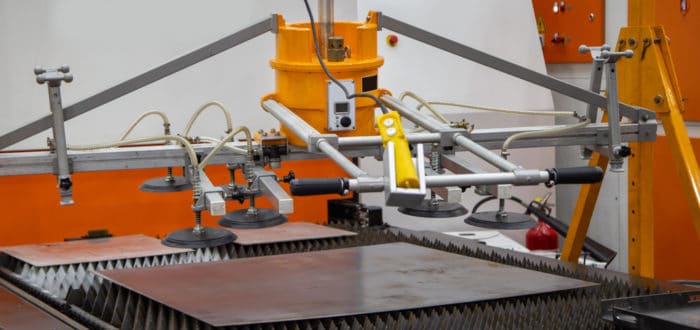Safer Pallet Loading using Vacuum Lifters
Filter By Category

Vacuum lifters are one of the most helpful pieces of equipment in the modern warehouse or factory, helping reduce injuries caused by manually loading or unloading items from pallets.
Manual unloading means twisting and contorting the body in unnatural positions. These positions, over time, increase the risk of developing musculoskeletal problems, repetitive strain injuries, and chronic pain in the shoulders, lower back, core (abdomen), and knees.
One way both employers and staff can ensure a healthy and safe work environment is by using a vacuum lifting equipment. This helps avoid picking up heavy or bulky objects manually.
What is a vacuum lifter?
Vacuum lifting systems are manual handling devices that are used to lift and lower sheet materials such as glass or steel; blocks or slabs of material such as marble or concrete. Other types of vacuum lifters are ideal for lifting sacks, bags and boxes. The lifting mechanism can be supported from a range of infrastructure. This includes jib cranes, overhead bridge cranes, and for uses requiring mobility, mounted to the front of a walkie stacker.
How vacuum lifters help alleviate strains and injuries
Vacuum tube lifters reduce the force required to handle any item by using its vacuum function to “grip” on to items. The vacuum also assists in lifting the product. In a pallet loading scenario, a vacuum lifter will pick up boxes, bags, and flat objects such as sheet metal and wood panel.
Most vacuum lifter equipment incorporates a handle design into the vacuum nozzle, which doesn’t require manual handling of items for loading or unloading. They can be angled to pick up objects at the top, middle, or centre of a pallet so a staff member need not unnaturally bend to accommodate.
What you should know about vacuum lifters
Before using a vacuum lifter to lift objects from pallets, you should check the lifter’s rated capacity for loads. The vacuum lifter should also be properly maintained.
Staff should be thoroughly trained in vacuum lifter operation and safety precautions before attempting to use vacuum lifting equipment. Its location should also be considered in any workplace health and safety system. Vacuum lifters should not be placed in high traffic areas for example.
Safety tips for vacuum lifter operation
Staff should take extra care that materials lifted by a vacuum lifter are never suspended over people or objects, if dislodged, could cause harm to others. Operators should also ensure each load is supported by the vacuum. If the sides of a bag load are not fully sealed by the vacuum action, the bag could fall and cause injuries.
Remember: vacuum lifters do not completely eliminate risks in manual handling. Good workplace health and safety practices still apply when using lifters in loading and unloading pallets.
For more information on vacuum lifters to reduce manual handling in your workplace, please contact Sitecraft on 1300 363 152.